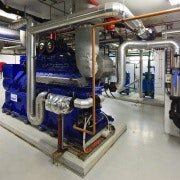CLIMATE SPECTATOR: AGL rings the alarm bells
The National Electricity Market is becoming an unviable investment proposition for all forms of new generation and the NEM is consequently at risk of "systemic failure”, prominent electricity retailer AGL Energy has warned ahead of its annual general meeting today.
The call comes just days after it halted construction on the gas-fired Dalton power station in New South Wales due to unfavourable market conditions, specifically soft demand.
Criticising the decisions of regulators in South Australia and Queensland, AGL chair Jeremy Maycock said new investment was likely to dry up, even in renewables.
"When these decisions (to regulate down retail prices) are added to the current policy uncertainty around the future of carbon pricing and the 2020 renewable energy target, no-one should be surprised to see new investment in the NEM evaporate, with all the consequences that would follow,” he said.
"The continued regulation of retail prices and overlapping state and federal regulatory structures creates a real risk of systemic failure of the National Electricity Market.”
The company is set to defer all investment in South Australia, which means its renewables projects in the state – the 99 MW Mt Bryan (Hallett 3) wind farm and 186 MW Barn Hill wind farm – will remain in cotton wool.
In reality, its renewables pipeline in South Australia has somewhat stalled recently and the decision makes little difference, for now. In fact, we already know that an oversupply of RECs is likely to see large-scale renewables investment remain soft until at least 2014 and then pick up dramatically between 2016 and 2020, assuming the renewable energy target remains in its current form.
While there are some alarming quotes from AGL's leading executives, despite policy mistakes, the drying up of investment is likely not as dire as made out.
If you look closely at recent stats you will find that not only has electricity demand been falling but critically, peak demand as well.
The issue of peak demand has been heavily publicised, and discussed in Climate Spectator on countless occasions. To recap, $40 billion of network upgrades have been committed over five years to ready us for ever increasing peak demand, such that now around a quarter of our generation is used on only 1-2 per cent of days. It's a remarkable stat but one that becomes more worrying when taken in line with news that not only has demand been falling, but so have the peaks, something that makes claims of ‘gold plating' more pertinent.
As you can see in the below graph from the Australian Energy Regulator, seasonal peak demand in the NEM has been on the decline since 2008/09 in both winter and summer. In fact, winter peak demand is off almost 10 per cent from its peak in 2008 and summer peak demand is off just shy of 15 per cent since 2008/09.

This three-year period of reducing peak demand coincides with the years of overall demand weakening. In the latter case, the first year of deterioration was put down to the impact of the global financial crisis. The next was blamed on milder weather conditions and it was only the third year that most analysts began to say ‘hang on, there seems to be a trend here'.
In the same way, perhaps peak demand is going through the same stages, just a little more under the radar. After all, how many times have you heard people say peak demand is actually falling, particularly from within the electricity sector?
Given weakness in peak demand and demand in general, AGL's claims the NEM is becoming an unviable investment proposition for new generation largely ring true. Warnings the NEM is at risk of systemic failure however, appear over-the-top.
















